Armchair Safari – Tracking Wounded Buffalo
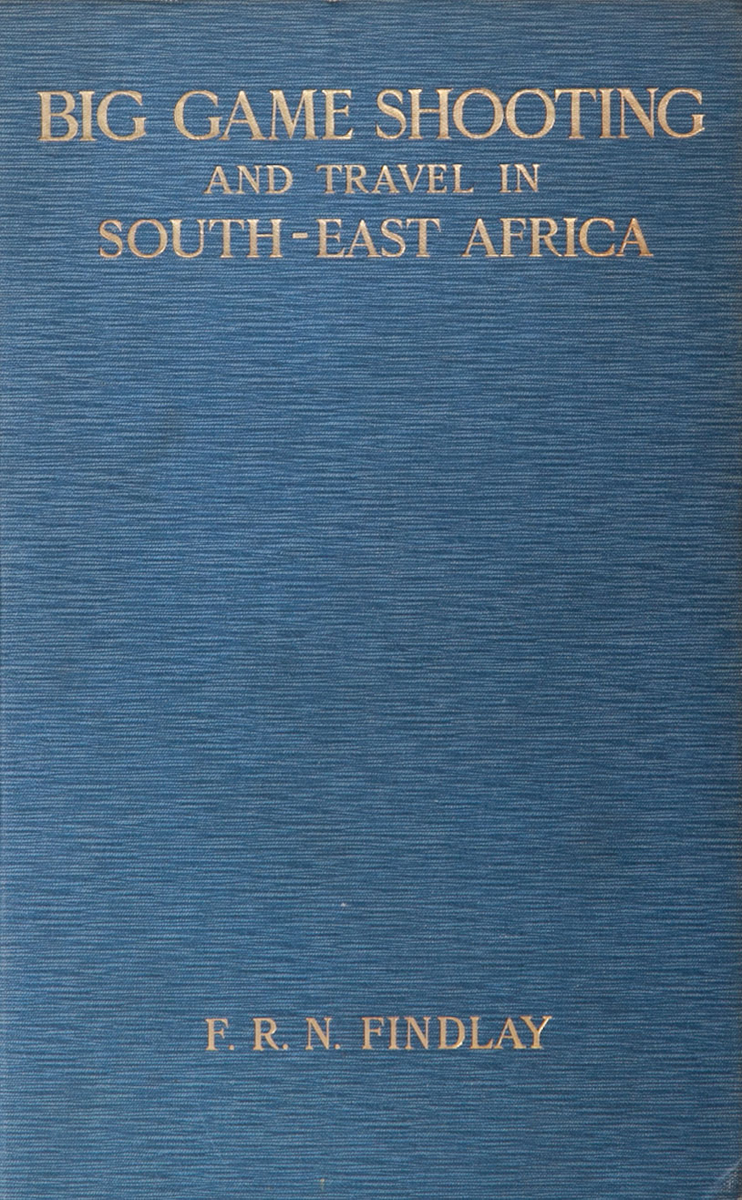 The penetrating rays of the sun were struggling to pierce the dense mist which at eight o’clock still enshrouded the country when Belt (my partner) and myself, accompanied by half a dozen boys, left our camp on the Jungwe stream heading for the Madingue-dingue River. We hoped to find buffalo in the tract encircled by that river and another, known as Monongoia Island. Having secured services of two locals we continued along a path through dense reeds about eight feet high on the right bank of the stream before turning towards a swamp. One of our guides, a short, thick-set native, was a demon at getting over swampy ground. The other, a light skinned native, who might have passed for a Zulu, carried a long spear which often showed high above the grass.
The penetrating rays of the sun were struggling to pierce the dense mist which at eight o’clock still enshrouded the country when Belt (my partner) and myself, accompanied by half a dozen boys, left our camp on the Jungwe stream heading for the Madingue-dingue River. We hoped to find buffalo in the tract encircled by that river and another, known as Monongoia Island. Having secured services of two locals we continued along a path through dense reeds about eight feet high on the right bank of the stream before turning towards a swamp. One of our guides, a short, thick-set native, was a demon at getting over swampy ground. The other, a light skinned native, who might have passed for a Zulu, carried a long spear which often showed high above the grass.
After crossing a swamp with two to three feet of water, and floundering about amongst the clinging duckweed, we cut fresh spoor and droppings of a single buffalo. Then came the welcome word “inyati” from one of the boys who had climbed the topmost branches of a leafless tree. We tightened grips on our rifles and advanced in the direction the wind compelled us to take. The grass, three to four feet tall, afforded us ample cover until we got within 300 yards of a herd which, being rarely disturbed in this virgin area, was sleeping in a bare open spot.
Leaving our boys, Belt and I crawled to within 150 yards of the 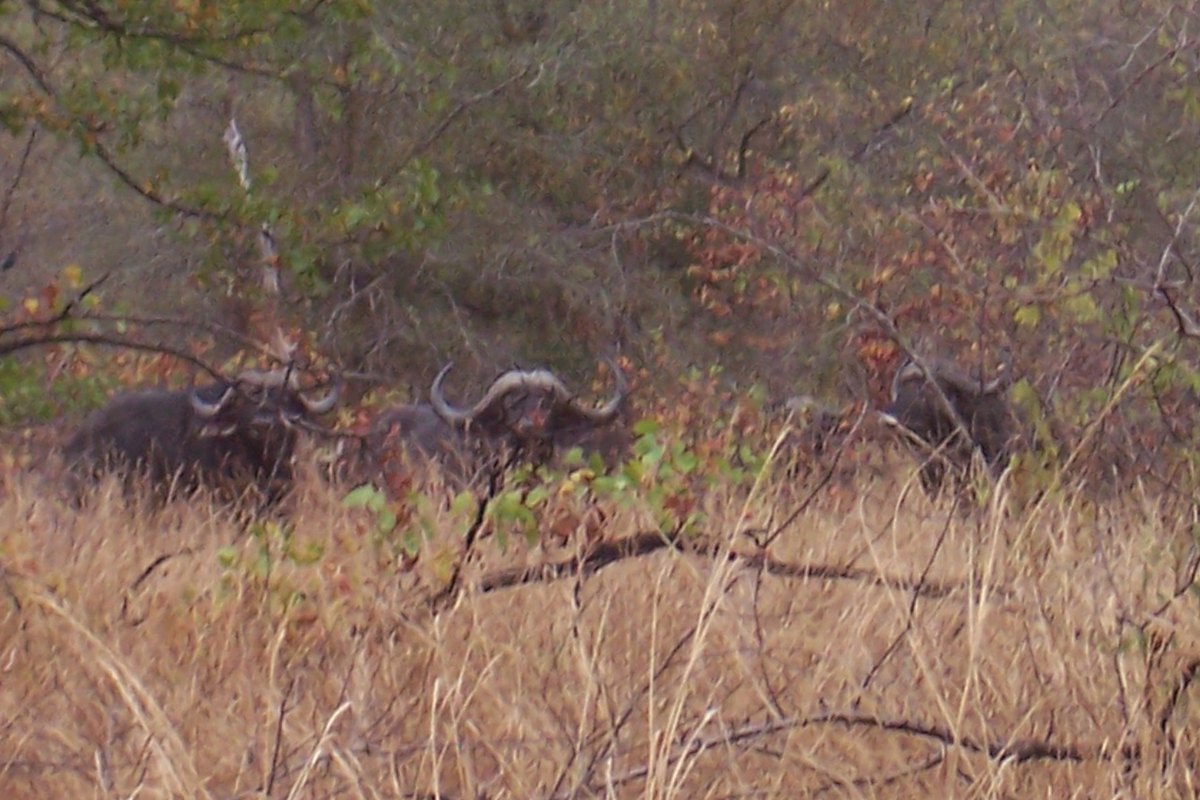 nearest bull, a grand old fellow with a pair of exceedingly massive yet apparently worn down horns. He was lying in the middle of the open patch. To our left, about 20 cows and a couple of waterbucks meandered. To our right, 300 yards off, were more buffalo, wildebeest, zebra and waterbuck and 200 yards beyond another mixed group. It was a grand sight to behold these animals fearlessly lying in the open so late in the morning.
nearest bull, a grand old fellow with a pair of exceedingly massive yet apparently worn down horns. He was lying in the middle of the open patch. To our left, about 20 cows and a couple of waterbucks meandered. To our right, 300 yards off, were more buffalo, wildebeest, zebra and waterbuck and 200 yards beyond another mixed group. It was a grand sight to behold these animals fearlessly lying in the open so late in the morning.
Belt had first shot and as he touched the trigger of his Gibbs .450 the peaceful scene was rudely broken. On receiving the shot, the bull jumped up and made off. Thinking that Belt’s shot had hit, I fired at a bull making off at the rear of the herd and instead wounded a wildebeest bull. Failing to find blood spoor I began to circle at random when suddenly the wildebeest sprang up almost at my feet. Another shot from my Mauser and it was dead. I was now anxious to rejoin the group.
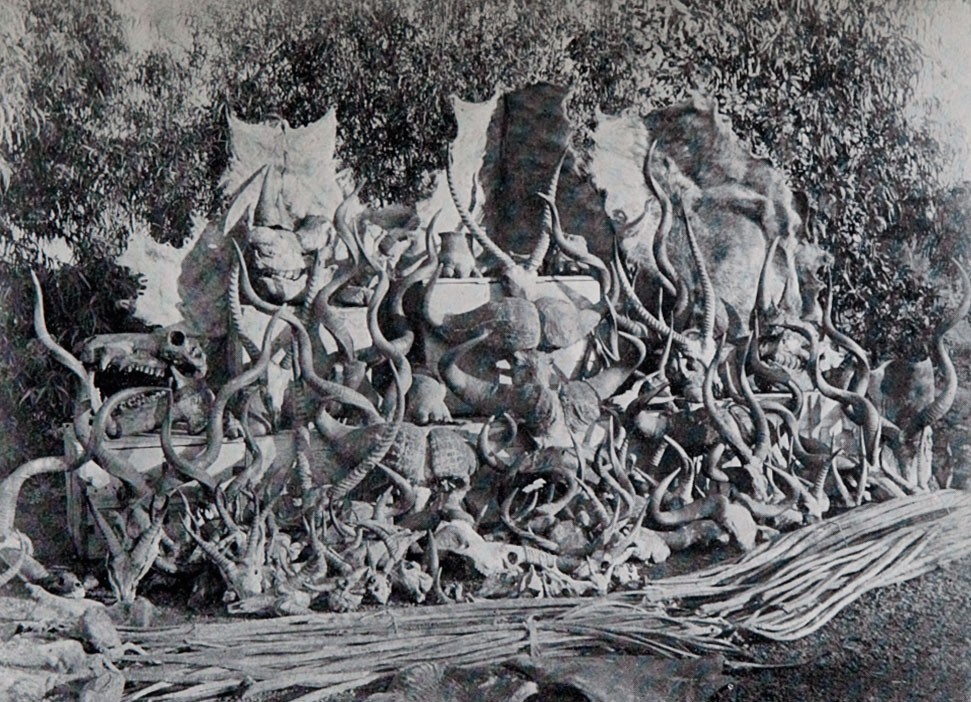 Hastily retracing my steps, I rejoined the group and sent a couple of boys to cut up the wildebeest. Belt explained that the buffalo had entered the long grass. We found his spoor leading through it, with here and there a small clot of mud adhering to the stems which had evidently been thrown up by the animal’s hooves. Farther on, a speck of blood. The sight of blood was sufficient to make our gun-bearers fall to the rear and soon we saw them only in a tree top, or were reminded of their presence by their warning wails.
Hastily retracing my steps, I rejoined the group and sent a couple of boys to cut up the wildebeest. Belt explained that the buffalo had entered the long grass. We found his spoor leading through it, with here and there a small clot of mud adhering to the stems which had evidently been thrown up by the animal’s hooves. Farther on, a speck of blood. The sight of blood was sufficient to make our gun-bearers fall to the rear and soon we saw them only in a tree top, or were reminded of their presence by their warning wails.
Advancing by a series of semicircular casts, we came upon a small patch of blood where the buffalo had stood for some time. But after another several hundred yards with nothing, we began to think it had gone back to rejoin the main group. Suddenly, glancing to one side, I spotted some blood on a spot where it had been standing head on, at right angles to the track. Had it remained there it would have charged as I passed, and would have probably bowled me over, even if I managed a point blank shot.
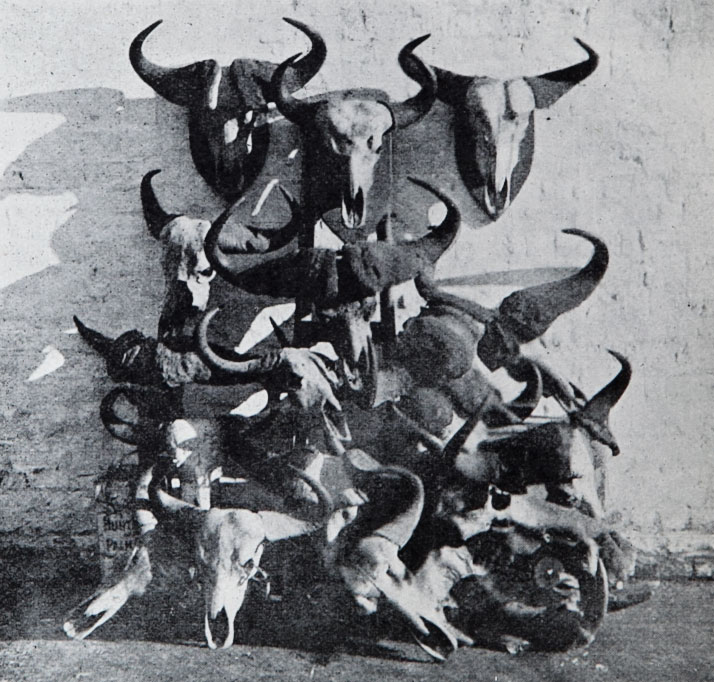 While beating about there came a sudden bellow, a rush and a crash and then all was silent for a moment. These ominous sounds came from behind a dense mass of almost impenetrable bush about 12 paces ahead. Every instant we expected to see the buffalo break through the barrier and dash at us. We stood our ground and before long there was another rush as the buffalo passed within 15 yards of us, but out of sight, and lumbered away at a heavy, swinging pace which seemed to denote that its foreleg was bleeding between the knee and shoulder, a conclusion which was confirmed by the height at which we found blood on the grass. I was sorry to give up the chase but it was evident the animal was not badly wounded.
While beating about there came a sudden bellow, a rush and a crash and then all was silent for a moment. These ominous sounds came from behind a dense mass of almost impenetrable bush about 12 paces ahead. Every instant we expected to see the buffalo break through the barrier and dash at us. We stood our ground and before long there was another rush as the buffalo passed within 15 yards of us, but out of sight, and lumbered away at a heavy, swinging pace which seemed to denote that its foreleg was bleeding between the knee and shoulder, a conclusion which was confirmed by the height at which we found blood on the grass. I was sorry to give up the chase but it was evident the animal was not badly wounded.
After following the spoor, we decided to change tactics and follow the herd. There was also a chance the bull was going to rejoin it and if not, there was another bull in the herd. With all the boys, we struck across the veld until we cut the trail of the herd which soon led us into a track of the wildest country imaginable. Just as we reached the other side of a dambo two buffalo bulls rushed from a patch of reeds and passed close in front of us. They were going at a tremendous pace. Belt and I each got in a hurried shot, our bullets telling with a dull thud on the larger of the two bulls, which, the very next moment, disappeared into the long grass. Then we heard a distant rushing and crashing noise as the main herd, startled by our shots, broke from a dense mass of reeds several hundred yards ahead.
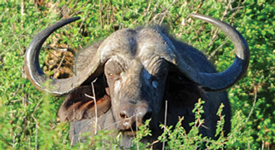 Again we followed the spoor of the wounded bull when we heard one of the boys shouting from a tree that he could see it. But the bull soon made off again. We were then in the middle of as bad a patch of brush and sand as any sportsman could imagine. It was impossible to advance except along the track which the buffalo had mowed through by sheer strength. At times we felt hopelessly engulfed in the rank vegetation, sometimes bound hand and foot, knowing we could never avoid a charge and not knowing where the buffalo or his companion was.
Again we followed the spoor of the wounded bull when we heard one of the boys shouting from a tree that he could see it. But the bull soon made off again. We were then in the middle of as bad a patch of brush and sand as any sportsman could imagine. It was impossible to advance except along the track which the buffalo had mowed through by sheer strength. At times we felt hopelessly engulfed in the rank vegetation, sometimes bound hand and foot, knowing we could never avoid a charge and not knowing where the buffalo or his companion was.
Suddenly I realized that I needed more cartridges and called to my boy to bring more, when suddenly a buffalo rushed out from a patch of grass about 12 paces ahead. He was gone in an instant and neither of us fired. It was lucky that I shouted when I did or we would likely have walked right up to its horns or hooves. We continued dangerous tracking into the veritable chaos of trees, scrubby bush and stunted palms. It was clear that when the expected charge took place, only the one in front would be able to fire.
We continued trying to advance until Belt came to the conclusion that it was mad to continue as the odds were then entirely with the buffalo. Slowly we painfully retraced our steps, none too proud of ourselves. We thought of F.C. Selous’ comments, “that nothing made of flesh and blood is more tenacious of life than a buffalo.” I failed to see vultures in the neighborhood so it is possible that this buffalo also survived.
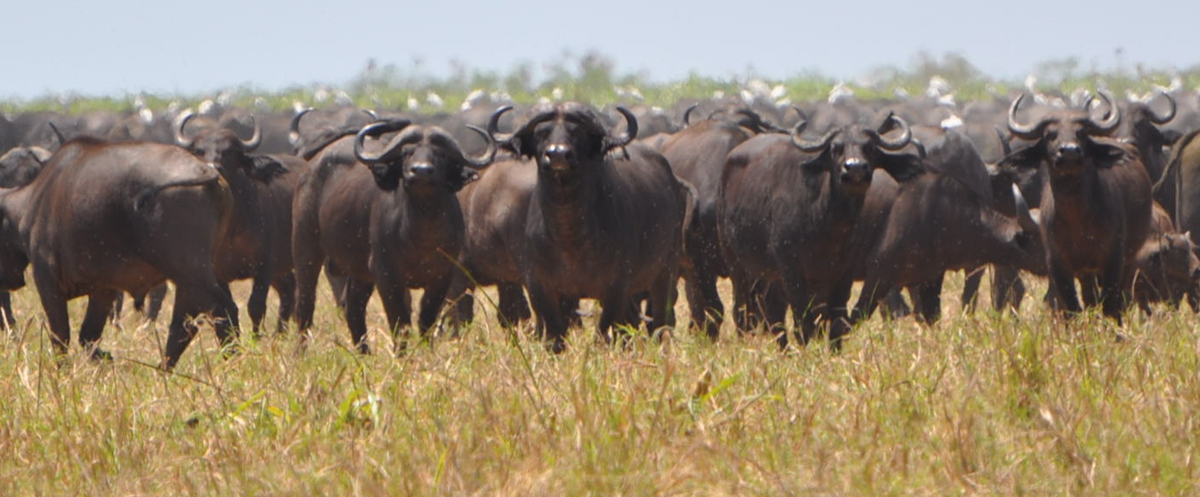 The trail along which we proceeded became broader and more clearly defined and for the next hour we rapidly followed it. The track which a herd of 50-60 buffalo rushing through the country leaves behind them is surprising. At one place the herd mowed down a passage fully 15 yards wide through a belt of the tallest and broadest reeds I have ever seen. This enabled us to follow at a trot, the hundreds of feet having broken the stems into pulp.
The trail along which we proceeded became broader and more clearly defined and for the next hour we rapidly followed it. The track which a herd of 50-60 buffalo rushing through the country leaves behind them is surprising. At one place the herd mowed down a passage fully 15 yards wide through a belt of the tallest and broadest reeds I have ever seen. This enabled us to follow at a trot, the hundreds of feet having broken the stems into pulp.
Within an hour of sunset we got up to the herd, standing, strangely enough on one of the few open glades we had seen that day. We could not get closer than 200 yards, so I took aim at a fine old bull at the rear of the herd and fired, and got in a second shot for insurance. As a ran to a spot where the bull had entered the long grass, a cow got up and ran. I found the bull lying down, evidently very sick and I put an end to its sufferings as it jumped up. My final shot passed through both lungs. Several natives whose kraal was not far off were attracted by the shots and soon put in an appearance. Great was their excitement at the prospect of a feast. Requesting the boys to send for a pot of palm wine for everyone I began to skin and cut up the carcass. In due course we started back for the kraal, the boys carrying as much as they could, the remainder given to local natives. Fortunately there was a footpath three miles higher up the river. We passed some other native kralls. Having doubts about the cleanliness of their proffered food, we stewed waterbuck meat and boiled some roots. By the time we got back it was in the middle of a dark and starry night.
Back at camp, fires were rekindled and we indulged in a tot of whiskey and did justice to our cook’s guinea fowl. Over pipes and coffee we reviewed the many exciting moments of the day’s sport, discussed the programme for the morrow, and retired to our tents for the night.

